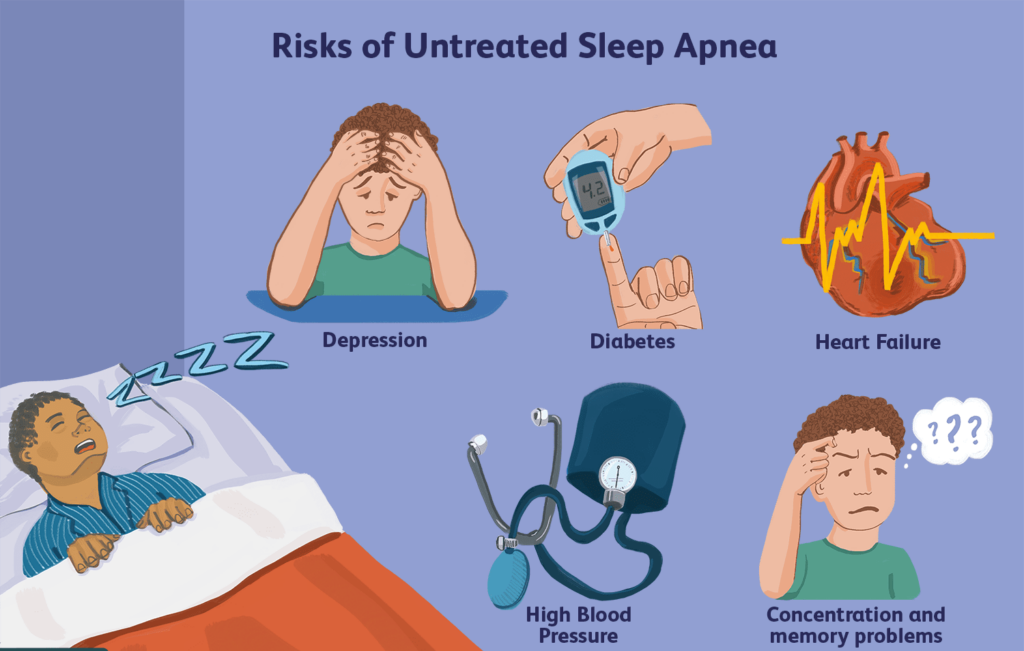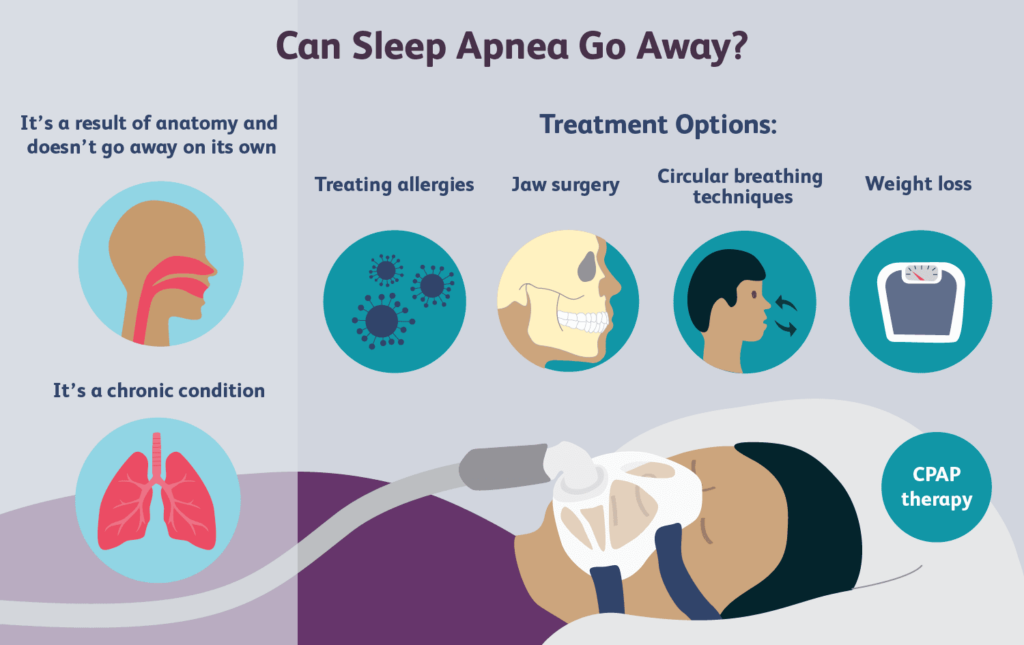Sleep apnea is a common sleep disorder characterized by pauses in breathing or shallow breathing during sleep. It can significantly impact one’s quality of life and overall health if left untreated.
Understanding the nature of sleep apnea, its symptoms, and the connection to long-term health risks is crucial for individuals to seek timely diagnosis and appropriate sleep apnea machine. This article aims to shed light on the potential consequences of untreated sleep apnea and emphasize the importance of addressing the condition.
Understanding Sleep Apnea
Sleep apnea is a sleep disorder that affects millions of people worldwide. It occurs when the upper airway becomes partially or completely blocked, leading to interruptions in breathing. These pauses can last for a few seconds to minutes and may occur repeatedly throughout the night. As a result, the flow of oxygen to the brain and vital organs is disrupted, causing fragmented and poor-quality sleep. Click here to get how modern science is revolutionizing sleep apnea treatment options.
Defining Sleep Apnea
Sleep apnea is categorized into three types: obstructive sleep apnea (OSA), central sleep apnea (CSA), and complex sleep apnea syndrome (CSAS). OSA is the most common type and occurs when the muscles in the back of the throat fail to keep the airway open, despite efforts to breathe. CSA, on the other hand, happens when the brain fails to send proper signals to the muscles that control breathing. CSAS is a combination of both OSA and CSA.
Obstructive sleep apnea is often associated with certain risk factors, such as obesity, older age, male gender, family history, and certain anatomical abnormalities. It is more prevalent in individuals with a larger neck circumference, as excess fat around the neck can put pressure on the airway. Additionally, alcohol consumption, smoking, and the use of sedatives can further increase the risk of developing sleep apnea.

Common Symptoms of Sleep Apnea
People with sleep apnea often experience excessive daytime sleepiness, which can significantly impact their daily functioning. This excessive sleepiness is caused by the disrupted sleep patterns and the constant interruptions in breathing throughout the night. It can lead to difficulties in concentration, memory problems, and even an increased risk of accidents, especially while driving or operating heavy machinery.
Loud snoring is another common symptom of sleep apnea. The blockage in the airway causes vibrations in the throat tissues, resulting in the characteristic snoring sound. It is important to note that not all individuals who snore have sleep apnea, but it can be a significant indicator, especially when accompanied by other symptoms.
Episodes of gasping or choking during sleep are also prevalent in individuals with sleep apnea. These episodes occur when the airway is completely blocked, and the individual struggles to breathe. It can be a frightening experience, both for the person with sleep apnea and their bed partner.
Other symptoms of sleep apnea may include restless sleep, morning headaches, dry mouth, and frequent awakenings during the night. Restless sleep is often a result of the body’s constant effort to overcome the airway obstruction, leading to tossing and turning throughout the night. Morning headaches can occur due to the decreased oxygen levels during sleep and the strain on the cardiovascular system. Dry mouth is a result of breathing through the mouth instead of the nose, which is common in individuals with sleep apnea. Frequent awakenings can disrupt the sleep cycle and prevent the individual from reaching deep, restorative sleep.
It is important to note that not all individuals with sleep apnea exhibit the same symptoms. Some may only experience mild symptoms, while others may have more severe and noticeable signs. If any concerning signs are observed, it is essential to seek medical evaluation to determine the underlying cause and appropriate treatment options.
The Connection Between Sleep Apnea and Long-term Health Risks
The Role of Sleep in Overall Health
Quality sleep is crucial for physical and mental well-being. During sleep, the body undergoes essential processes such as tissue repair, hormone regulation, and brain function consolidation. It is during this time that the body recharges and prepares itself for the challenges of the next day. However, when sleep is disrupted, these restorative processes are interrupted, leading to a host of potential health issues.

How Sleep Apnea Affects the Body
Sleep apnea, a common sleep disorder, can result in low oxygen levels in the blood and high levels of carbon dioxide. This occurs when the airway becomes partially or completely blocked during sleep, causing brief pauses in breathing. These pauses, known as apneas, can happen multiple times throughout the night, disrupting the normal sleep cycle.The chronic stress placed on the cardiovascular and metabolic systems due to sleep apnea can have far-reaching consequences. When oxygen levels drop and carbon dioxide levels rise, the body goes into a state of alarm. This triggers a cascade of adverse physiological effects, including increased blood pressure, heart rate, and inflammation.Over time, these physiological changes can contribute to the development of various health conditions if left unaddressed. One of the most significant risks associated with sleep apnea is cardiovascular disease. The increased strain on the heart and blood vessels can lead to the development of conditions such as hypertension, coronary artery disease, and even heart failure.In addition to cardiovascular risks, sleep apnea has also been linked to metabolic disorders. The disruption of normal sleep patterns can affect the body’s ability to regulate blood sugar levels, leading to an increased risk of developing type 2 diabetes. Furthermore, sleep apnea has been associated with weight gain and obesity, which are known risk factors for various health conditions, including diabetes and cardiovascular disease.Moreover, the impact of sleep apnea extends beyond physical health. The chronic sleep deprivation caused by this sleep disorder can have a significant impact on mental well-being. Sleep is essential for cognitive function, memory consolidation, and emotional regulation. When sleep is disrupted, individuals may experience difficulties with concentration, memory recall, and mood disturbances. This can have a profound effect on overall quality of life and may contribute to the development of mental health disorders such as depression and anxiety.In conclusion, sleep apnea is not just a sleep disorder; it is a condition that can have serious long-term health implications. The disruption of normal sleep patterns and the resulting physiological changes can increase the risk of cardiovascular disease, metabolic disorders, and mental health issues. Recognizing the connection between sleep apnea and these health risks is crucial in order to promote early detection, proper diagnosis, and effective treatment strategies.
Specific Health Risks Linked to Untreated Sleep Apnea
Sleep apnea is a serious sleep disorder that affects millions of people worldwide. It is characterized by pauses in breathing or shallow breaths during sleep, leading to disrupted sleep patterns and decreased oxygen levels in the body. While the immediate consequences of untreated sleep apnea, such as daytime sleepiness and fatigue, are well-known, the long-term health risks associated with this condition are often overlooked.
Cardiovascular Complications
One of the most concerning health risks linked to untreated sleep apnea is its impact on cardiovascular health. The repeated episodes of oxygen deprivation place significant stress on the heart and blood vessels, leading to a higher risk of developing hypertension, coronary artery disease, heart failure, and stroke. The lack of oxygen triggers a cascade of physiological responses, including inflammation, high blood pressure, and the formation of blood clots, which can have detrimental effects on the cardiovascular system.
Moreover, the chronic sleep deprivation caused by sleep apnea can disrupt the body’s natural circadian rhythm, leading to an imbalance in hormone production. This hormonal imbalance further contributes to the development of cardiovascular complications, as hormones play a crucial role in regulating blood pressure, heart rate, and blood vessel function.
Metabolic Disorders
In addition to its impact on cardiovascular health, sleep apnea has also been associated with the development of metabolic disorders. Research has shown a strong link between sleep apnea and insulin resistance, glucose intolerance, and an increased risk of developing type 2 diabetes. The disrupted sleep patterns and altered hormone levels caused by sleep apnea can disrupt the body’s ability to regulate blood sugar effectively, leading to insulin resistance and impaired glucose metabolism.
Furthermore, the chronic inflammation that occurs as a result of untreated sleep apnea can also contribute to the development of metabolic disorders. Inflammation disrupts the normal functioning of cells and tissues, impairing insulin signaling and increasing the risk of insulin resistance and diabetes.

Mental Health Implications
Sleep apnea not only affects physical health but also has profound effects on mental health. Research has shown strong links between sleep apnea and mental health conditions such as depression, anxiety, and cognitive decline. The chronic sleep deprivation and oxygen deprivation caused by sleep apnea can impair brain function, leading to difficulties in concentration, memory, and mood regulation.
Moreover, the disrupted sleep patterns and constant interruptions in breathing can contribute to feelings of frustration, irritability, and decreased quality of life. Sleep apnea patients often report experiencing mood swings and a general sense of dissatisfaction, which can further exacerbate mental health issues.
It is important to recognize the potential long-term health risks associated with untreated sleep apnea. Seeking proper diagnosis and treatment for sleep apnea is crucial not only for improving sleep quality but also for reducing the risk of developing serious cardiovascular complications, metabolic disorders, and mental health issues.
The Importance of Diagnosing and Treating Sleep Apnea
Recognizing the Signs of Sleep Apnea
Recognizing the signs and symptoms of sleep apnea is crucial for early intervention. Many individuals with sleep apnea are unaware of their condition or dismiss their symptoms as merely being tired. Seeking medical evaluation if any concerning signs are observed is essential to receive an accurate diagnosis and appropriate treatment.
Treatment Options for Sleep Apnea
Several treatment options are available for sleep apnea, depending on the severity and underlying causes. Continuous positive airway pressure (CPAP) therapy, oral appliances, and lifestyle modifications such as weight management and positional therapy can help alleviate symptoms and reduce the associated health risks. In some cases, surgery may be recommended to address structural abnormalities contributing to sleep apnea.
Prevention and Lifestyle Changes
Healthy Sleep Habits
Maintaining a consistent sleep schedule, creating a conducive sleep environment, and practicing relaxation techniques can promote healthy sleep. Sleeping on the side rather than the back can also help prevent the collapse of the airway during sleep.
Weight Management and Exercise
Maintaining a healthy weight through regular exercise and a balanced diet can reduce the risk and severity of sleep apnea. Excess weight can contribute to airway obstruction, and losing weight can lead to improved sleep quality and reduced symptoms.
Avoiding Alcohol and Sedatives
Alcohol and sedative use can relax the muscles in the throat, exacerbating the symptoms of sleep apnea. It is advisable to avoid consuming these substances, particularly close to bedtime, to prevent further airway obstruction.In conclusion, untreated sleep apnea poses significant long-term health risks. From cardiovascular complications to metabolic disorders and mental health implications, the detrimental effects of sleep apnea on overall health cannot be underestimated. Recognizing the signs, seeking timely diagnosis, and exploring appropriate treatment options are essential steps in mitigating these risks. Additionally, implementing lifestyle changes such as maintaining healthy sleep habits, managing weight, and avoiding substances that relax the throat muscles can positively impact sleep apnea management. Prioritizing the diagnosis and treatment of sleep apnea is crucial for individuals to preserve their long-term health and well-being.

Leave a Reply